Contents
- 1. Praia do Camilo, Lagos
- 2. Praia da Marinha, Caramujeira
- 3. Praia da Falésia, Aldeia das Açoteias
- 4. Praia do Amado, Carrapateira
- 5. Praia da Quinta do Lago
- 6. Praia do Martinhal, Sagres
- 7. Praia de São Rafael, Galé
- 8. Praia da Arrifana
- 9. Praia do Alvor
- 10. Ilha de Tavira
- 11. Ilha de Cabanas
- 12. Praia de Cacela Velha
- 13. Praia de Monte Gordo
- 14. Praia dos Pescadores, Albufeira
- 15. Meia Praia, Lagos
- 16. Praia de Odeceixe
- 17. Praia do Evaristo, Sesmarias
- 18. Praia da Amoreira
Portugal’s southernmost region, the Algarve is distinguished by some of the best beaches in Europe.
This sun-soaked province comprises over 160 kilometers of south-facing coastline. Beyond the westernmost point of Cabo de São Vicente, it stretches a further 50 kilometers to the north.
The scores of fine sandy beaches embellishing the Algarve coast are as inviting as they are varied. Indeed, beachgoers are spoilt for choice!
Scented with fresh sea air and lapped by turquoise azure waters of crystalline luminance, these beaches can be found embraced by mustard and honey-colored sea cliffs or fringed by shallow, sheltered lagoons. Some are hidden away in quiet, scenic coves, while others face the thunderous might of the Atlantic Ocean.
Busiest during the summer, these powder-soft natural wonders are a joy to discover at any time of the year.
Portugal’s bathing season commences mid-June until the end of September, when teams of qualified lifeguards supervise beaches. Holiday resorts in the Algarve are also at their peak during this time.
Beachgoers should note that a green flag flying over the sand indicates that it’s safe to swim; a yellow flag denotes caution: stay within your depth! If a red flag is hoisted, do not enter the water. A checkered flag indicates that the beach is temporarily without lifeguard support.
Numerous Algarve beaches have been honored with a Blue Flag, a coveted environmental citation indicating that the destination meets with stringent management and sustainability criteria, and that the water is of optimum quality.
Plan your day by the sea on Portugal’s southern coast with our list of the top beaches in the Algarve.
1. Praia do Camilo, Lagos
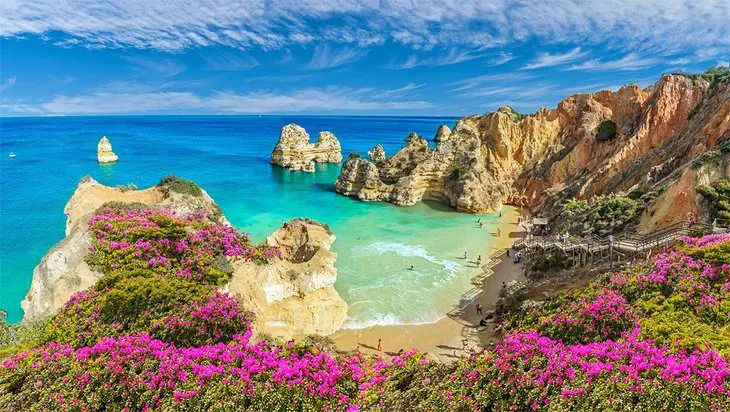
Blessed with picture-book looks, this sensational little beach is deserving of its reputation as one of the Algarve’s most scenic pockets of sand.
Hemmed in either side by craggy cliffs splashed with ocher and mustard tones, Blue-Flagged Praia do Camilo is reached by following a long wooden staircase that descends from the cliff top over beds of Mediterranean saltbush, cistus, and white-leaved rockrose.
Lapped by a luminous ocean of turquoise and aquamarine, the beach looks out over Lagos Bay, a panoramic view that takes in several sea stacks, some of which resemble the shape of giant rusty arrow points.
While the beach itself provides a glorious golden-yellow sunbed, beachgoers have to climb the 200 steps back to the top of the cliff to find Camilo’s restaurant and separate toilet facilities.
An obvious favorite with locals and visitors alike, Praia do Camilo is reached from Lagos by a tarmac-topped road. Limited organized car parking is available, but summer sees space quickly snapped up.
2. Praia da Marinha, Caramujeira
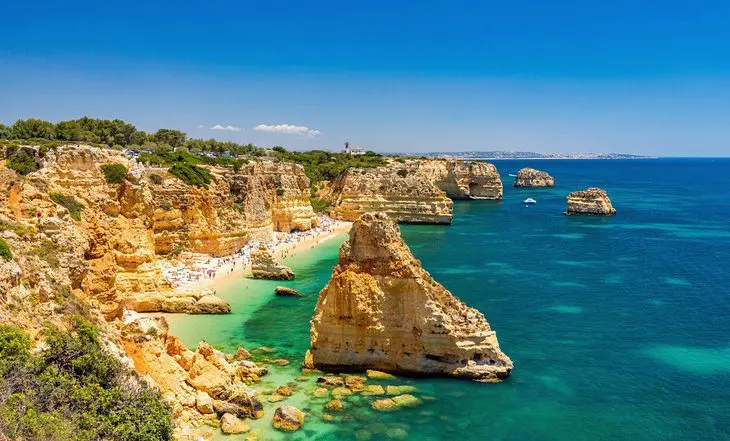
One of Portugal’s signature beaches, Praia da Marinha is also emblematic of the Algarve and its natural splendor.
Spread out along the base of sheer honey-hued cliffs, this beautiful beach of soft golden sand is fronted by a shallow translucent sea that on calm days takes on the appearance of a polished, crystal mirror.
Praia da Marinha is a snorkeler’s paradise. You can spend hours exploring all sorts of curious submerged rock formations, such as arches, caves, and ledges.
The clear waters teem with a remarkable variety of marine life, and there’s even a special underwater nature trail to follow that in deeper waters attracts scuba divers.
Support infrastructure extends to a restaurant with toilet facilities, plus a cliff-top car park from which the beach is accessed, though the steep staircase can prove challenging to the less able.
A Blue Flag beach, Praia da Marinha gets very busy during the summer months.
But if it all starts feeling a tad overwhelming, why not go for a leisurely walk along the cliff-top path? The views alone are worth the effort.
3. Praia da Falésia, Aldeia das Açoteias
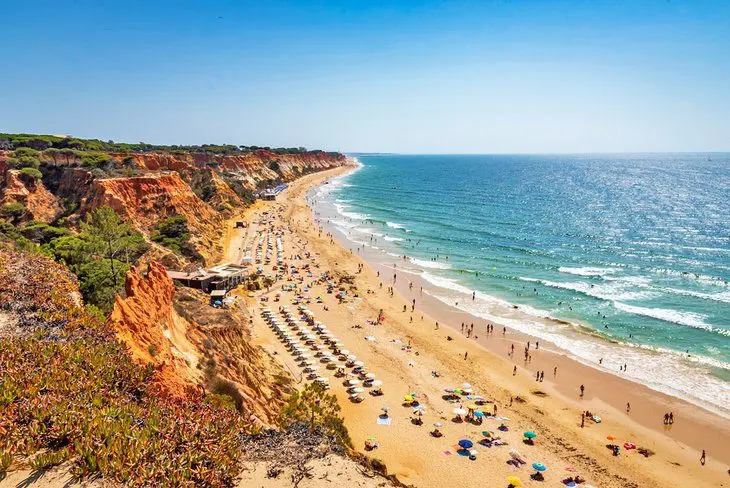
A line of copper red-colored sandstone cliffs studded with umbrella pine flanks popular Praia da Falésia, a powder-soft ribbon of sand that’s part of a continuous beach almost six kilometers in length.
It’s the erosion of the cliffs that keeps the beach super sandy, and it’s why Falésia, a Blue Flag destination, is one of the Algarve’s most popular beaches, and one of the finest beaches in Portugal.
The ample dimension of Falésia means it’s never too crowded, even in high season.
Backed as it is by a couple of upscale hotels and dotted with beach shack cafés and several restaurants, Falésia is as much an opportunity to dine out as it is a place to catch sun. Nearby
For the more active, the hiking trail etched into the cliff tops is well trodden, and one of the most rewarding coastal walks in the region.
4. Praia do Amado, Carrapateira
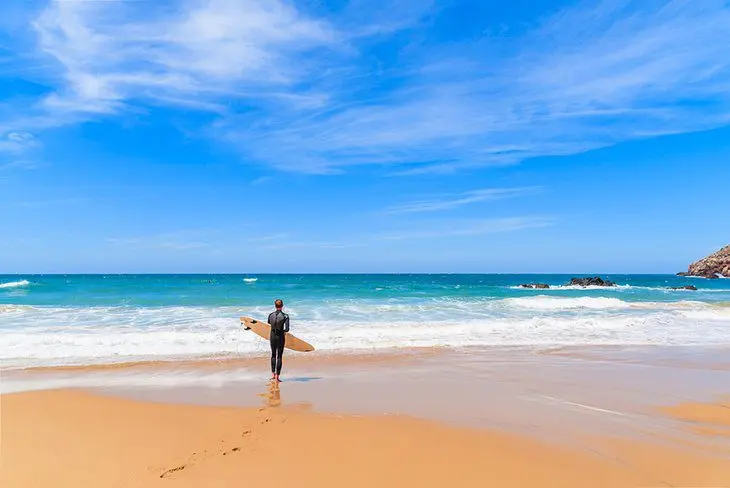
If you’re a surfer, Praia do Amado is one of the best beaches in the region to hang ten.
Stretching along three valleys on the western Algarve’s Atlantic coastline, Amado is a huge half-moon of sand embraced by cliffs of craggy schist that help heighten the sense of the wild and dramatic.
Famed for its reliable year-round waves, the beach enjoys a nationwide reputation as a top surfing destination.
Indeed, Blue-Flagged Amado is a frequent venue for national and international competitions in the sport.
As you’d expect, leisure amenities extend to several board hire and surfing equipment concessions.
Unsurprisingly, Amado attracts the more adventurous and free-spirited beachgoer to its secluded, windblown shores. And even if you don’t know a surfboard from an ironing board, there are plenty of amazing walks to follow that showcase a myriad of stunning flora and fauna.
5. Praia da Quinta do Lago
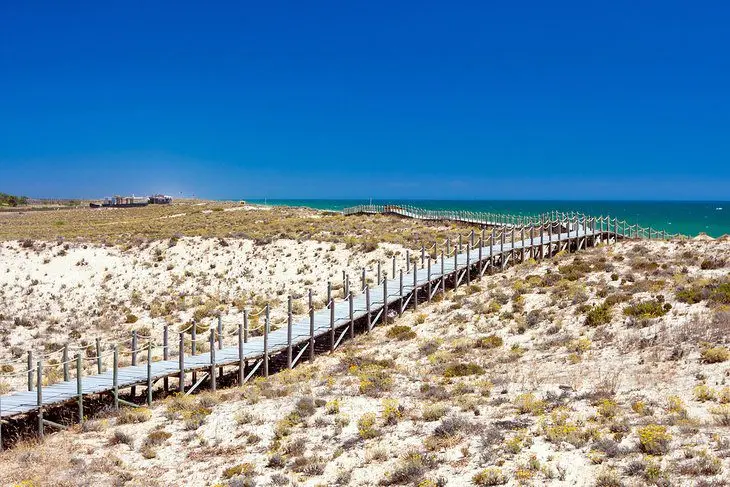
Located in the heart of the protected Parque Natural da Ria Formosa, this beach is named for the most luxurious tourist resort destination in Portugal.
Associated primarily with upscale villa accommodation and a cluster of world-class golf courses, Quinta do Lago is equally appreciated for its Blue Flag beach.
Accessed via a 300-meter-long wooden pedestrian bridge – itself a recognized regional landmark – Praia da Quinta do Lago is, in effect, one of the park’s barrier islands, a series of enormous low-lying sand dunes anchored in the shallow lagoons that characterize this wetland environment.
Sunseekers with an appreciation for the natural world have the best of both worlds here. Besides offering secluded sunbathing and a palpable sense of peace and quiet, Praia da Quinta do Lago is a prime bird-watching area.
Wildlife enthusiasts can follow a nature trail to an observatory on Lake São Lourenço where you can observe a variety of waterfowl, including the rare purple gallinule. And it’s not uncommon to spy flocks of gracious flamingos, their rose-pink plumage shimmering brightly in the sun.
6. Praia do Martinhal, Sagres
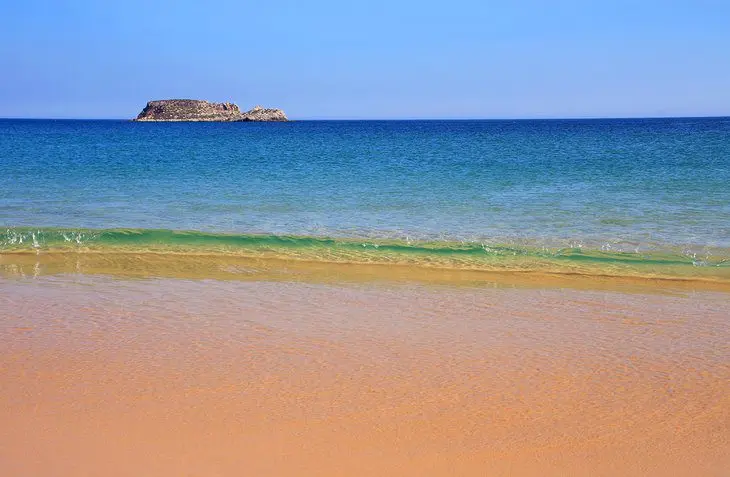
Sitting snuggly in a picturesque bay near Sagres, Praia do Martinhal is a wonderful family-friendly option.
The waters here are calm and inviting, the shallows perfect for paddling and splashing around in.
Blessed with a carpet of fine powdery sand as soft as a kiss, the Blue Flag beach at Martinhal sweeps around in a gentle arc to the Sagres promontory, a natural feature that helps moderate the north wind when it whips off the Atlantic to lure windsurfers looking to harness the stiff breezes.
In fact, Martinhal enjoys a reputation as a preferred water sports destination. A number of outfitters serve the region during the summer months for surfing, body boarding, and kite surfing.
Scuba diving is especially popular, the limestone islets set in the bay providing rewarding underwater exploration.
For lunch or dinner, beachgoers can take advantage of some excellent nearby restaurants, and there’s plenty of informal parking.
7. Praia de São Rafael, Galé
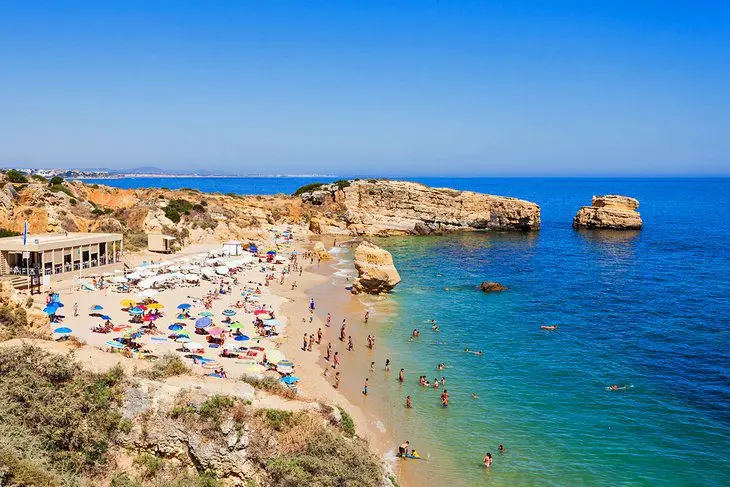
Another picture of perfection, Praia de São Rafael is framed on three sides by craggy and serrated limestone – wonderful natural features that if you use your imagination resemble huge crumbling gingerbread.
The beach amazes with its variety of rock formations, a result of sea, wind, and rain erosion that’s taken place over centuries.
Two of these natural wonders, Ponte Pequena (“Little Point'”) and Ninho das Andorinhas (Swallows’ Nest”), have appeared on numerous post cards.
The beach itself is an inviting wedge of beige-yellow sand that meets a cyan sea.
On days when the ocean is super clear, you can catch a glimpse of the eerie outline of submerged rocks – ideal snorkeling territory!
One of several tempting beaches clustered in the area – and all rewarded with Blue Flags – São Rafael is easily reached from the road connecting the town of Guia to the resort of Galé.
There’s ample organized parking, and leisure facilities include a noted seafood restaurant.
8. Praia da Arrifana
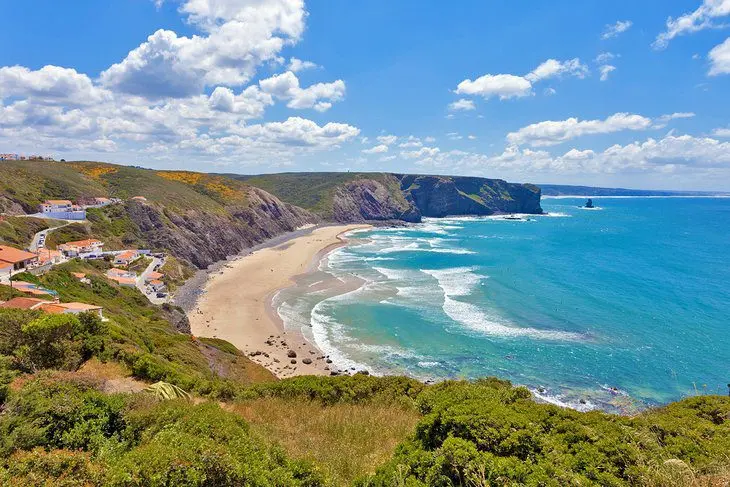
A signature western Algarve beach, Praia da Arrifana is another top surfing destination.
Molded into a pretty shell-shaped bay, the beach is somewhat narrow but stretches for more than 700 meters and is hemmed in by imposing black schist sea cliffs.
The southern end of Arrifana is distinguished by a pencil-thin sea stack known as Pendra da Agulha (“Needle Rock”), an iconic landmark that defines this area of the Parque Natural do Sudoest Alentejano e Costa Vicentina.
The beach, the recipient of a coveted Blue Flag, is named for the sleepy cliff-top fishing hamlet of Arrifana.
Out of season, you can hear a pin drop, but with the advent of summer, the place welcomes a predominantly young, local crowd looking for great waves and plenty of R&R (the surf school does a roaring trade).
A cluster of cafés, snack bars, and inexpensive restaurants serve beachgoers and hikers, lured here by a marvelous walking trail that affords breathtaking panoramic views across the beach and beyond.
9. Praia do Alvor
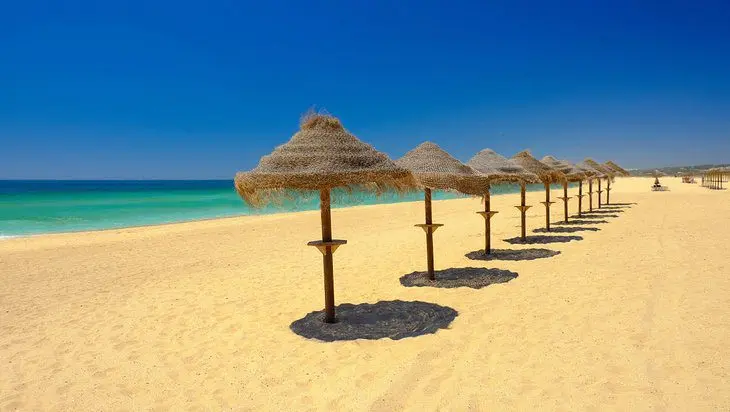
Are you a kitesurfing aficionado? Then Praia do Alvor is where to raise your game and fly with the wind.
Located in the wide bay of Lagos, this long, wide, and spotless beach encloses Alvor Estuary and a huge lagoon of warm, shallow water.
The beach, effectively a giant sand barrier, is vast and stretches for as far as the eye can see.
Beachgoers flock here, and are well taken care of by a host of restaurants, cafés, and beachside recreational facilities.
But the real plus is the water sports opportunities afforded the destination by a quirk of nature.
Due to its orientation, Praia do Alvor tends to shelter the estuary’s water surface while still funneling a decent wind across the lagoons, a natural phenomenon locals have long taken advantage of.
Kitesurfers and windsurfers are in their element! Kayakers, too, appreciate the mirror-like calm and paddle-easy conditions.
Blue-Flagged Praia do Alvor is also blessed with a boardwalk that fringes the lagoon and provides a serene walk through a truly enchanting environment.
Benches along the walkway allow you to take in the views and appreciate the abundance of flora and fauna that lend texture and character to this seductive corner of the Algarve.
10. Ilha de Tavira
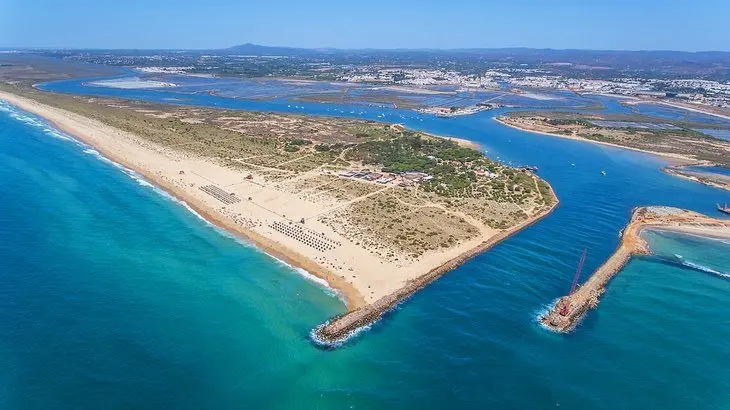
Located within the boundaries of the Parque Natural da Ria Formosa, Ilha de Tavira is an enormous sandbar and one of the bigger barrier islands moored between the coastline and the open sea.
A typical dune landscape of marram grass, sea holly, and sea thrift attracts a wealth of birdlife to Ilha de Tavira. Species spotted here include terns and all sorts of wading birds, such as the black-winged stilt. The island is also home to the bulbous-eyed Mediterranean chameleon.
In summer, flocks of day-trippers converge on its pristine shores. A Blue Flag reminds visitors of the destination’s spotless – but fragile – ecosystem.
A campsite and a collection of summer holiday homes increase numbers in the high season, but these are concentrated around the small jetty that serves as a mooring for ferries arriving from Tavira’s Quatro Águas docks.
The calmer, warmers waters of the beach on the estuary side of the island are a favorite with families: toddlers can dip their toes in the crystal-clear shallows under the watchful eyes of grown-ups.
Kitesurfers and windsurfers, meanwhile, are drawn to the windier, sloping ocean-facing sands.
11. Ilha de Cabanas
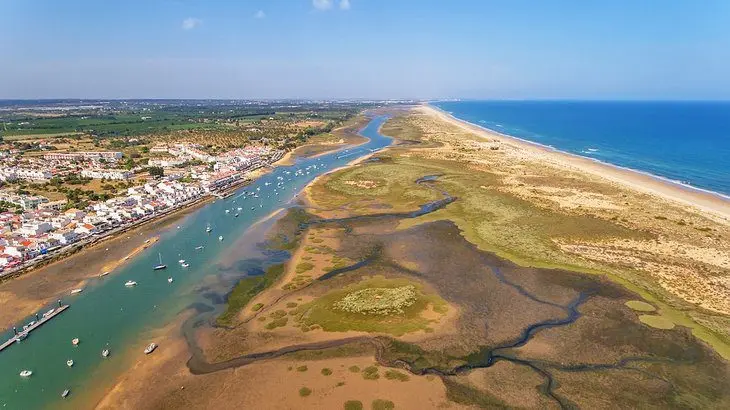
A short water taxi ride from the picturesque fishing village of Cabanas across a briny tributary of the Ria Formosa estuary delivers you to Ilha de Cabanas.
This is another one of the park’s barrier islands separating the mainland from the Atlantic Ocean.
The island, a narrow strip of sand that rises near Tavira and stretches all the way to the harbor at Cacela, is an unspoiled band of white gold that is rarely trodden, even at the height of summer.
In fact, if your idea of a beach vacation is relaxing in relative solitude away from the bucket and spade brigade, then Blue-flagged Cabanas ticks all the boxes.
You can walk for an hour in either direction and meet just a handful of people, locals probably, and while there are some recreational amenities at hand – a beach shack snack bar, plus toilet and changing facilities – the beach, for the most part, is yours.
The island’s proximity to the village means you’re never too far from some excellent seafood restaurants, including a delicious variety of fresh, charcoal-grilled fish.
12. Praia de Cacela Velha
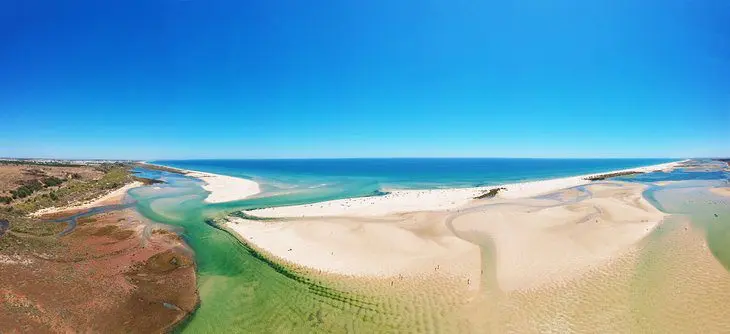
If Ilha de Cabanas mentioned above is your scene, and you crave even more of this kind of bliss but with even fewer people, take the short jaunt to Praia de Cacela Velha. This wonderful crescent of sand stretches for miles westward from the town of Manta Rota.
The waters here are warm and shallow, making them the perfect place for lolling about in your most colorful bathing suit. All this paradise does come with a price, one that most people are more than willing to pay – just two Euros! This is the cost to hire a boat from Cacela Velha to cross the estuary to get here. If you keep an eye on the tides, it is possible to walk the short distance from Cacela Velha to the beach at low tide.
Bring all your supplies with you – you won’t find any restaurants, washrooms, or other services out here. However, the small town of Cacela Velha is renowned for its fine offerings of fresh seafood caught daily. Grab a patio seat, settle in with a cold drink, and finish off your day with a bit of people watching.
13. Praia de Monte Gordo
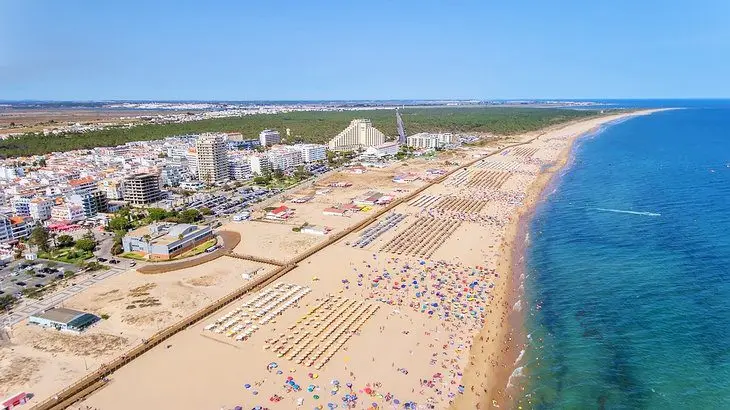
Monte Gordo is the easternmost resort town in the Algarve, and overlooks one of the longest and finest beaches in the region.
Set five kilometers west from Vila Real de Santo António, Monte Gordo was one of the first tourist centers to be developed in southern Portugal. It remains a popular vacation destination, especially with Spanish visitors who don’t have to travel far to reach this frontier hot spot.
Backed by a lively seafront avenue embroidered with well-manicured gardens, Praia de Monte Gordo is a magnet for families and water sports enthusiasts.
The smooth, flat sand makes it ideal for those with mobility issues, and the water here is renowned for being calm, warm, and pristine – qualities deserving of Monte Gordo’s Blue Flag.
A plethora of hotels, restaurants, and cafés, and a decent choice of shops and boutiques, offer up plenty of distraction for the beachgoer, as does the splendid three-kilometer raised wooden walkway that affords a memorable amble across the dunes that roll over the far end of the beach.
Accommodation: Where to Stay in Monte Gordo
14. Praia dos Pescadores, Albufeira
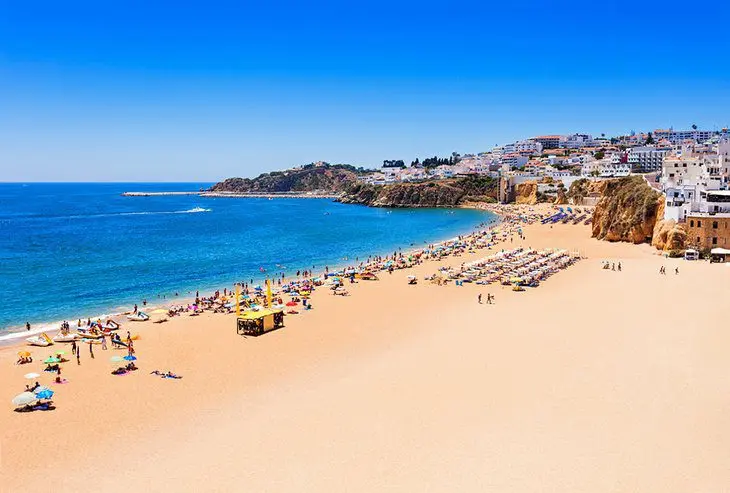
Blue Flag-awarded Praia dos Pescadores is an iconic Algarve beach destination.
It’s still known as “Fisherman’s Beach” despite the fact that the colorful traditional fishing boats that lent the beach its name are no longer hauled up on the sand after the catch.
Made up of a generous swathe of coffee-colored sand, this is Albufeira’s main and most central beach.
Backed by a Legoland of whitewashed apartments and hotel buildings, urban Praia dos Pescadores welcomes Europe during the summer months, when it can be a challenge claiming a strip of fresh sand.
But you won’t get bored on this beach! Leisure amenities abound, with plenty to see and do both on and off the sand.
There are restaurants and cafés at your feet, and Albufeira’s Old Town still offers vestiges of what the place looked like before mass tourism enveloped this once sleepy corner of Portugal.
15. Meia Praia, Lagos

“Half Beach,” as the name translates in English, is anything but. This is a huge, five-kilometer avenue of soft golden sand that stretches from Lagos all the way east to Alvor.
Following the gentle curve of Lagos Bay and backed by low dunes textured with marram grass, sea holly, and, in summer, delicate sea daffodil, Meia Praia by virtue of its size is a water sports playground.
The calm shallows make Blue Flag-awarded Meia Praia ideal for windsurfing, kitesurfing, jet skiing, and sailing.
On the beach itself, soccer and volleyball competitions regularly play out to enthusiastic spectators.
Development is low-rise and sparse in places, and you can easily end up in glorious seclusion the farther east you tread.
It’s busier at the western end of the beach, which is about a 40-minute walk from Lagos town center.
Here, a cluster of beach cafés and one or two restaurants cater to hungry sun seekers.
16. Praia de Odeceixe
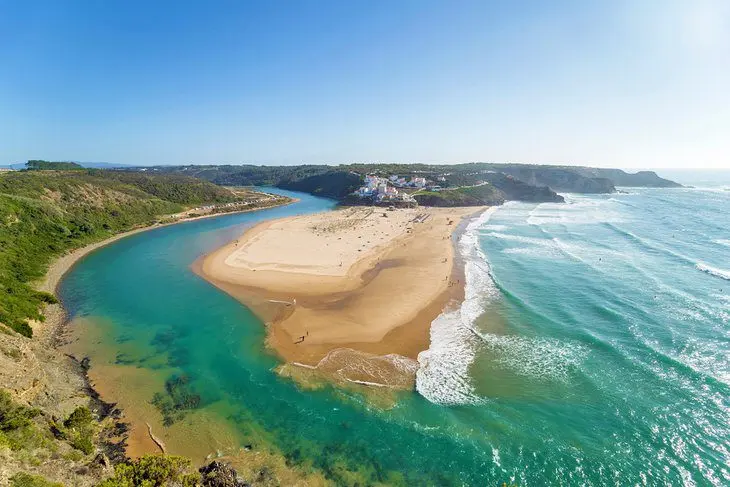
If solitude, seclusion, and adventure is your bag, make the effort to reach Praia de Odeceixe. You won’t be disappointed!
Set practically on the border with the Alentejo, this is the western Algarve’s most northerly beach.
It’s a half-moon carpet of sand wedged between vertiginous cliffs of schist embedded with veins of pearl-colored quartz that glisten in the sun like diamond necklaces.
Pummeled by a restless Atlantic Ocean, Praia de Odeceixe is named for the windmill-topped village that nestles nearby, surrounded by aromatic scrubland and clusters of cork oak. This is rural Algarve at its traditional best!
The River Seixe cuts a smile through the beach, providing a rare opportunity for canoeists to paddle a river and meet an ocean.
Lagoons form here at low tide, allowing for peaceful and wonderfully warm bathing.
Its stark, unspoiled beauty long ago earned Praia de Odeceixe a Blue Flag, but take note: Ocean currents can be unpredictable, and even seasoned surfers are wary of Odeceixe’s strong and sudden rip tides.
A car park, toilet facilities, and a couple of good restaurants are sited near the beach, which is reached at high tide by a footpath that descends the cliff next to the viewpoint.
Incidentally, Praia de Odeceixe lies adjacent to another, clothing-optional beach, one of Portugal’s few officially recognized naturist beaches.
17. Praia do Evaristo, Sesmarias
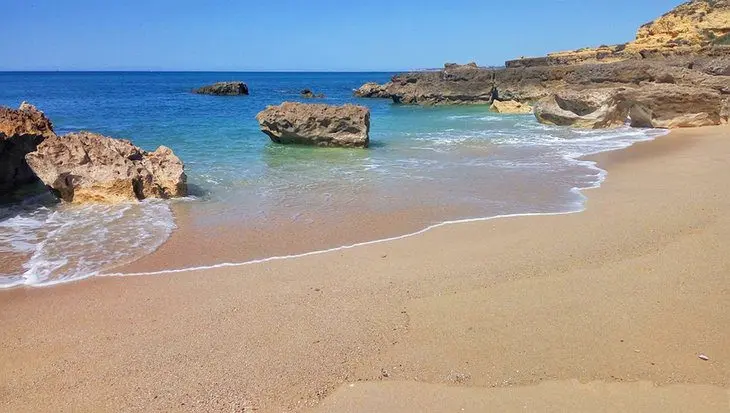
This attractive parcel of chestnut-hued sand was once a closely guarded secret, a local hideaway the location of which was only divulged with a nod and a wink.
That changed when a now noted seafood restaurant was built overlooking the beach. But rather than spoil the appeal of Praia do Evaristo, the upscale eatery ended up complementing the beach-going experience.
This tiny Blue Flag beach is a visual treat. Framed by seaweed-covered boulders and scented by fragrant stone pine, its picture-perfect outlook makes it one of the most attractive beaches in the vicinity.
Evaristo is also a veritable sun-trap – you’ll bronze easily and quickly here, so remember to pack the sun cream!
When it’s time to cool off, the emerald shallows afford wonderful paddling and snorkeling opportunities, the underwater rock formations providing shelter for all sorts of amazing marine life.
Car parking is at a premium, so if you want to experience the worth of this not-so-secret but still alluring patch of gold, arrive early.
18. Praia da Amoreira
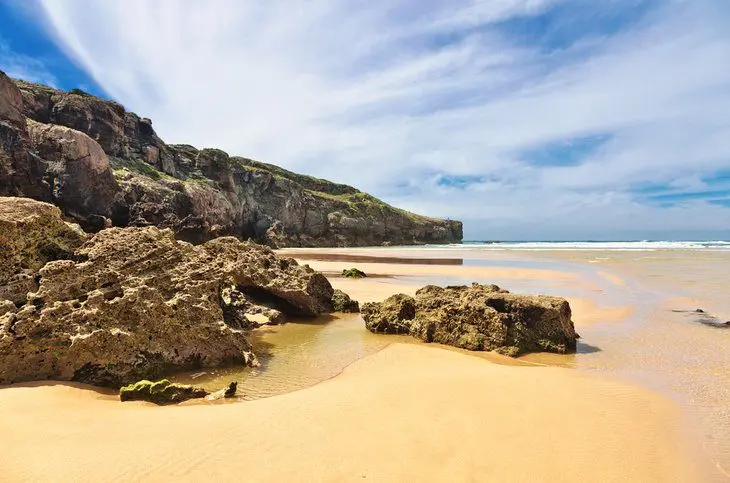
Praia da Amoreira is all about tough choices: warm, calm river waters or the waves of the salty sea. This beach is one of the least crowded along the coast, ensuring that you’ll always be able to find a perfect patch of sand.
If the day is hot, start in the ocean. Try your luck at body surfing in the waves, or if you’ve brought your water toys, perhaps a session of boogie boarding. Once you’ve cooled down enough, stroll over to the river and warm up in the fresh water. If you’ve really over-extended yourself, drag your beach chair into the shallows and rest up.
The rest of the day also presents some choices. Perhaps a nap under your beach umbrella or perhaps a stroll up the river to see some birdlife, or just opt for the most popular option: gazing out at the azure waters.
At the end of the day, relax at the small restaurant nearby, home to some of the freshest seafood in the area.









